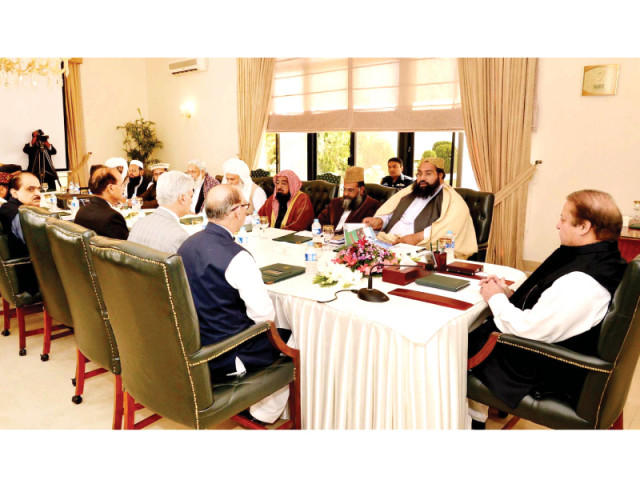Peace engagement: Crucial phase of talks set in motion
TTP intermediaries in N Waziristan for two-day meeting; Ulema Council pleads for release of prisoners by both sides.

Pakistan Ulema Council members met PM Nawaz Sharif on Thursday. PHOTO: PPI
As members of the Taliban-nominated committee reached North Waziristan Agency on Thursday, the head of the Pakistan Ulema Council appealed for the release of all non-combatant prisoners during a meeting with Prime Minister Nawaz Sharif in Islamabad.
Setting the second phase of the talks in motion, the TTP intermediaries arrived in the agency’s headquarters Miramshah via a helicopter at around noon.
An official of the political administration said North Waziristan Political Agent Siraj Ahmad Khan along with security officials received committee members Maulana Yousaf Shah, Professor Muhammad Ibrahim and Maulana Abdul Hai.
The official explained that the political agent gave them a briefing for about an hour after which the committee members travelled for three hours towards an undisclosed location in the agency to meet members of the TTP Political Shura. The interaction is seen as a full-blooded attempt to take the peace talks forward.

The intermediaries are expected to engage in dialogue for two days, holding discussions with Qari Shakeel, Maulvi Azam and Maulvi Zakir from the Taliban side.
The official raised the prospect of an extension in the month-long ceasefire agreed by the two sides, saying this could be one of the outcomes of the negotiations among other positive changes.
Goodwill gestures from both sides
In the federal capital, meanwhile, Pakistan Ulema Council (PUC) chairman Allama Tahir Ashrafi advised Prime Minister Nawaz Sharif to release non-combatant prisoners to ensure the success of the peace initiative.
He was heading the 10-member delegation of religious scholars who met with the premier at the PM House. PM Nawaz, according to Ashrafi, was non-commital, though he did promise that his government would “look into” the possibility.
Talking to The Express Tribune, Allama Ashrafi said, “We are also talking with the Taliban and asking them to release the abductees.” The release of prisoners from both sides would not only make the dialogue effective, but will also strengthen it, he added.
“PM Nawaz wants to establish peace without shedding a single drop of blood and we support him in his endeavour.”
Regulation of madrassas
The delegation also expressed its concerns related to the rumours about madrassas that stemmed out of the newly proposed National Internal Security Policy (NISP).
The NISP envisages reforms in the religious schools which reads “…reintegration also envisions the incorporation of madrassas in the mainstream educational framework. Understanding the critical role played by these institutions for a pluralistic society, it is important to integrate them within the national educational system by supporting their administration, financial audit and curriculum accreditation.”
“The prime minister has assured us that the government was not planning any crackdown on seminaries,” Ashrafi said. “There is fear everywhere [in the madrassas] and no one knows what is going to happen. But PM Nawaz has assured us that all those who are rendering their services for education and the religion have nothing to worry about.”
However, with a warning tone, he added, “We will not let anyone harass people associated with madaras.”
Responding to a question about the audit of madrassas, Ashrafi said that 11,360 seminaries are registered with the PUC and every single one of them undergoes an audit of accounts. “We have no issue if the government wants to see the audits.”
However, he said that “some people”, whom he did not name, were playing politics over the issue and were misinforming the masses.
Published in The Express Tribune, March 14th, 2014.



1725254039-0/Untitled-design-(24)1725254039-0-208x130.webp)















COMMENTS
Comments are moderated and generally will be posted if they are on-topic and not abusive.
For more information, please see our Comments FAQ